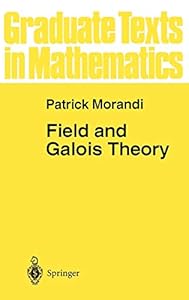#1,346 in Science & math books
Use arrows to jump to the previous/next product
Reddit mentions of Field and Galois Theory (Graduate Texts in Mathematics (167)) (v. 167)
Sentiment score: 2
Reddit mentions: 2
We found 2 Reddit mentions of Field and Galois Theory (Graduate Texts in Mathematics (167)) (v. 167). Here are the top ones.
or
Specs:
| Height | 9.21 Inches |
| Length | 6.14 Inches |
| Number of items | 1 |
| Weight | 2.976240537 Pounds |
| Width | 0.75 Inches |

I like this one: Field and Galois Theory by Patrick Morandi (Amazon).
This is also a classic: Galois Theory by Emil Artin (cheap Dover book on Amazon, legally free on Project Euclid).
I don’t know of any one book on field theory that I would recommend without qualification. All of them seem to drop one or two aspects that are, to me at least, very important.
My pet peeves are books that tip-toe around the concept of separability without actually showing how it is used. In particular, a lot of books do not show that if a is separable and algebraic over k, then k(a) is a separable algebraic extension.
With that I mind, you should look for a book that does:
Galois Theory and includes separability as an integral part of the treatment.
Algebraic closures
The Primitive Element theorem
Newton’s Theorem (Every symmetric polynomial in n variables is a linear combination of elementary symmetric polynomials in n variables.)
Compass and ruler constructions - for historical context
Solvability of third and fourth degree equations – for historical context
The equivalence of solvability by radicals and solvability of Galois groups.
An introduction to finite fields and an introduction to cyclotomic extensions
Some stuff about traces and norms
Even if you do find a book with all of these things but you still might find it insufficient because you do not understand the author’s way of treating the above topics. It is always possible to run into authors who will treat some subject in such a way that you will become confused about a theorem that you already knew. So I have looked at lots and lots of books with different treatments. Here is a list of some of the books I own and why I own them.
Ian Stewart, Galois Theory – Good introduction but tip-toes around separability.
Joseph Rotman, Galois Theory - Good introduction but tip-toes around separability.
Paul McCarthy, Algebraic Extensions of Fields – Best treatment of separability I have seen. Does not do historical material.
Patrick Morandi, Field and Galois Theory – Seems to do everything
Jean Pierre Escoffier, Galois Theory - Good historical content but treats separability as an afterthought.
I Martin Isaacs, Algebra A Graduate Course – Treatment of fields within a larger context. Does not solve cubic or quartic
Irving Kaplansky, Fields and Rings – Includes lectures on rings and homological dimension.
There are a couple of others that are worth having around for specific purposes.
Harold Edwards, Galois Theory – I think this book is really old fashioned but sometimes old fashioned is very much worthwhile. In particular, the book contains an English translation of Galois’s original memoir.
Gary L Mullen and Carl Mummert, Finite Fields and their Applications – Shows applications of finite fields in combinatorics and cryptography
I do not care for Artin’s treatment of Galois Theory. He starts out with a field and a group of automorphisms of that field. He then considers the fixed field of the automorphism group as the base field. I have two problems with this. First, this setup brings along the normality of the extension for free and makes proofs a lot easier. Second, this is almost the never way problems start. Problems usually start with a base field and a polynomial over it. Then you must construct a normal extension of the field to get anywhere. Kaplansky does much of the same thing but he seems, to me at least, to be easier to understand even though he is very terse.
If I had to do anything, I would start with Rotman and shift over to McCarthy when I wanted to learn about separability. I would keep Isaac’s around for a general reference. I would also look into Edwards and Escoffier for historical context. However, you are not me so I would expect you to have differing opinions.
As you can probably tell, I had a particularly difficult with Galois theory, and I have spent a long time trying to understand it. My advice is to keep your mind open and try to understand it from several different viewpoints and from several different sources.
Edit: sppeling